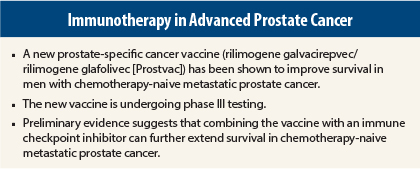Emerging evidence suggests that immunotherapy may play an important role in treating prostate cancer. In particular, preliminary results have shown that combining a new vaccine with ipilimumab (Yervoy) boosts overall survival in men with castration-resistant prostate cancer.1 A study comparing data from three independent trials of the vaccine won a Merit Award at the 2015 Genitourinary Cancers Symposium.
Rilimogene galvacirepvec/rilimogene glafolivec (Prostvac) is a poxvirus-based, prostate-specific vaccine being developed by Bavarian Nordic in partnership with the National Cancer Institute (NCI). Ipilimumab, an immune checkpoint inhibitor, is approved for the treatment of melanoma and is being evaluated in a phase III trial in metastatic castration-resistant prostate cancer.
“On the heels of the success of immunotherapy in metastatic melanoma, immunotherapy is an active area of study in prostate and other cancers. The approach in this phase I study was to prime the immune cells with [the vaccine] and then intensify immunotherapy with ipilimumab to further enhance the immune response,” said lead author Harpreet Singh, MD, of the National Cancer Institute.
Overall Survival Benefit
Two previous phase II trials by the same group looked at the vaccine alone and found an overall survival benefit in men with metastatic castration-resistant prostate cancer. The first trial, which included 125 men, found a median overall survival of 25.1 months. The second trial, which included 32 men, showed a median overall survival of 26.6 months. Both trials demonstrated improved overall survival over that predicted by the Halabi nomogram (a model that uses historical data to estimate survival of prostate cancer patients after castration): The first study showed an 8.5-month improvement in median overall survival, and the second had a similar 9.1-month improvement in median overall survival compared with predicted survival, Dr. Singh told The ASCO Post.
These studies led to an international phase III trial of the vaccine in men with metastatic castration-resistant prostate cancer and minimal symptoms who are chemotherapy-naive. That trial has just finished accrual.
“It is clear that vaccine therapy alone improves overall survival,” Dr. Singh stated.
Phase I Trial
She also presented updated phase I results of a study of 30 patients with metastatic castration-resistant prostate cancer (and baseline characteristics similar to those in the phase II trials) treated with the combination of the vaccine plus escalating doses of ipilimumab. Follow-up was about 80 months.
The predicted survival of chemotherapy-naive patients with metastatic castration-resistant prostate cancer is 18.5 months on the Halabi nomogram, she said. The updated overall survival analysis showed a median overall survival of 31.3 months using the intensified immunotherapy approach. The most impressive results were seen in the group receiving the highest dose of ipilimumab (10 mg/kg) plus the vaccine: a median overall survival of 37.2 months.
“There is a tail in the curve. About 20% of these patients on the highest dose of ipilimumab are alive at 80 months,” Dr. Singh said.
Hypothesis-Generating Data
“These hypothesis-generating data suggest it is rational to combine vaccine and immunotherapy. Anti–PD-1 or anti–PD-L1 immunotherapies [antibodies against programmed cell death protein 1 or its ligand] are of interest in this regard. They appear to have less toxicity than ipilimumab. If we combine the vaccine with one of these agents, we may improve outcomes,” she stated.
Many others in the field of prostate cancer are excited about the promise of immunotherapy. In the Genitourinary Cancers Symposium Daily News, L. Michael Glodé, MD, University of Colorado at Denver, wrote: “The remarkable advances recently reported in melanoma [with immunotherapies] … provide hope that we may be only in the earliest phase of truly effective treatment of metastatic prostate cancer, with the ultimate goal of long-term remissions or even immunologically driven ‘cure.’”2
Dr. Glodé called the trial results reported by Dr. Singh “promising” and suggested that using the new vaccine could be more cost-effective than sipuleucel-T (Provenge), a vaccine approved in the predocetaxel setting. ■
Disclosure: Dr. Singh reported no potential conflicts of interest. Dr. Glodé and colleagues received research funding for the phase II trial of Prostvac from Bavarian Nordic.
References
1. Singh H, Madan RA, Dahut WL, et al: Combining active immunotherapy and immune checkpoint inhibitors in prostate cancer. 2015 Genitourinary Cancers Symposium. Abstract 172. Presented February 26, 2015.
2. Glodé LM: Immunotherapy for prostate cancer: Past, present, and future. 2015 Genitourinary Cancers Symposium Daily News, February 27, 2015.




